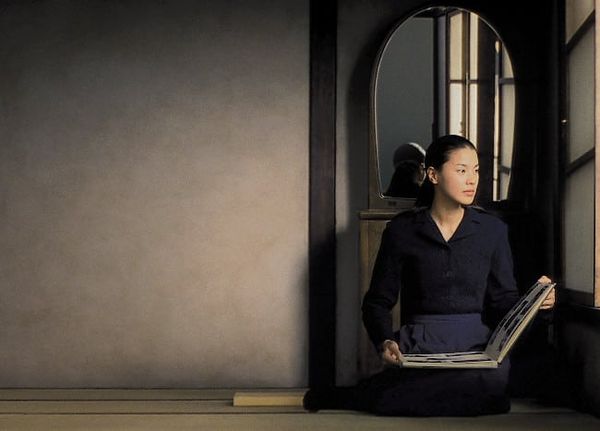Eye For Film >> Movies >> Maborosi (1995) Film Review
Maborosi
Reviewed by: Amber Wilkinson

There's a fresh chance to see this enigmatic debut feature from Hirokazu Kore-eda in UK cinemas at the moment as it enjoys a re-release on the back of his critically acclaimed and Oscar-nominated Shoplifters. It's well worth the effort for fans of his work, even though it lacks some of the wit and verve of his later features.
Maborosi - adapted by Yoshihisa Ogita from Teru Miyamoto's short story Maborishi No Hikari (A Trick Of The Light) - is a quiet and episodic consideration of grief and its impact on a young mother, Yumiko, (Makiko Esumi), who has unresolved issues regarding death stemming back to childhood, when she was unable to stop her forgetful grandmother leaving the family home never to come back. In adulthood, she marries her childhood sweetheart Ikuo (Tadanobu Asano) only for tragedy to strike. As she moves, with their son Yuichi (Gohki Kashiyama) to a different part of the country, after a spot of matchmaking by a neighbour, questions of whether she can find happiness with new husband Tamio (Takeshi Nait?) and his daughter remain.

The spare scripting is a far cry from the busy screenplays of Kore-eda's more recent work, that build character and empathy through dialogue. Here, spaces are elevated above people, so that we're given time to judge the impact places such as the cool rooms of Yumiko's new home or the raging sea on her doorstep have on her in contrast to the basic cosiness of her previous life. Kore-eda opts to avoid close ups, adding to the air of Yumiko being one step removed from those around her, the sound of a small bell on a bike key a talismanic reminder of what she has lost.
There are plenty of flashes of the brilliance Kore-eda has come to be known for in the years since, however, particularly in interactive scenes with little or no dialogue. One extended sequence sees the 'new' step-siblings playing together in a variety of landscapes, already showing the director's ability to tap into and capture the natural movements and enthusiasms of childhood. He's always had a sharp eye for movement in general, and the middle-distance shots he uses here allow that to come to the fore, whether he's watching Yumiko's grandmother walking as the young Yumiko chases her down or observing Tamio playing with Yuichi on his bike.
Generally, this film engages more intellectually with emotion than Kore-eda's later more heartfelt work but there's a beautiful spot of bonding in a boat between Yuichi and his new granddad, a moment of repose speaking volumes about comfort and familiarity, as does the shared family joy of melon pip spitting on their veranda. Throughout, the action is supported by a gentle and judiciously employed score from Chen Mingchang. Kore-eda keeps a measured pace that does threaten to come to a complete stop once or twice but for the most part it is a film that invites you to rock gently with its swell and the motions of Yumiko's grief, as she finds that coming to terms with questions is sometimes as important as finding answers to them.
Reviewed on: 02 May 2019

















